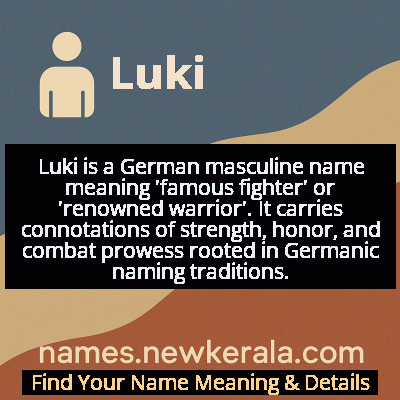Luki Name Meaning & Details
Origin, Popularity, Numerology Analysis & Name Meaning of Luki
Discover the origin, meaning, and cultural significance of the name LUKI. Delve into its historical roots and explore the lasting impact it has had on communities and traditions.
Name
Luki
Gender
Male
Origin
German
Lucky Number
8
Meaning of the Name - Luki
Luki is a German masculine name meaning 'famous fighter' or 'renowned warrior'. It carries connotations of strength, honor, and combat prowess rooted in Germanic naming traditions.
Luki - Complete Numerology Analysis
Your Numerology Number
Based on Pythagorean Numerology System
Ruling Planet
Saturn
Positive Nature
Ambitious, efficient, realistic, and authoritative.
Negative Traits
Materialistic, stressed, confrontational, and can be overly ambitious.
Lucky Colours
Dark blue, black.
Lucky Days
Saturday.
Lucky Stones
Blue sapphire, amethyst.
Harmony Numbers
2, 4, 6.
Best Suited Professions
Business leaders, managers, financial services, law enforcement.
What People Like About You
Leadership, determination, organizational skills.
Famous People Named Luki
Luki Botha
Racing Driver
Competed in Formula One and won multiple national racing championships
Luki Goslar
Resistance Fighter
Organized underground networks against Nazi regime during WWII
Luki Bauer
Cross-Country Skier
Olympic athlete with multiple World Cup medals in skiing
Luki Essender
Martial Artist
Multiple championship titles in European MMA circuits
Name Variations & International Equivalents
Click on blue names to explore their detailed meanings. Gray names with will be available soon.
Cultural & Historical Significance
In contemporary German culture, Luki maintains this martial heritage while adapting to modern sensibilities, often chosen by parents who value both traditional strength and approachable familiarity. The name's evolution mirrors Germany's own transformation from feudal warrior societies to modern industrial power, retaining martial symbolism while embracing contemporary usage patterns. This cultural continuity demonstrates how ancient naming traditions can persist even as societies modernize, with Luki serving as a bridge between Germany's warrior past and its present identity.
Extended Personality Analysis
Individuals named Luki are typically perceived as courageous, determined, and fiercely loyal. They often exhibit natural leadership qualities combined with a protective instinct toward those they care about, embodying the 'famous fighter' essence of their name. These personalities tend to be action-oriented rather than contemplative, preferring to solve problems through direct intervention and physical engagement. Their fighting spirit manifests not just in physical confrontations but in overcoming life's challenges with resilience and tenacity.
While they can be competitive and sometimes stubborn, Lukis generally balance their warrior nature with strong moral compass and sense of justice. They thrive in situations requiring quick decision-making and often excel in careers that demand both mental and physical fortitude. Their combination of bravery and loyalty makes them reliable friends and formidable opponents, with an innate ability to inspire others through their actions rather than words. This personality profile reflects the name's Germanic roots while adapting to contemporary social contexts where emotional intelligence complements traditional strength.
Modern Usage & Popularity
In contemporary Germany and German-speaking regions, Luki maintains moderate popularity as both a given name and nickname. While not among the top 100 names nationally, it sees consistent usage particularly in southern Germany and Austria where diminutive forms remain fashionable. The name has experienced a slight resurgence in recent years as parents seek names that blend traditional Germanic roots with modern, approachable sounds. It's particularly popular among families with military or athletic backgrounds who appreciate its warrior connotations, and social media and gaming culture have also contributed to its modern appeal among younger generations who embrace the name's fighting spirit in digital environments.
Symbolic & Spiritual Meanings
Symbolically, Luki represents the eternal struggle between strength and compassion, embodying the warrior who fights not for conquest but for protection. The name carries metaphors of the human spirit's resilience against adversity, serving as a reminder that true strength includes moral courage and emotional fortitude. In Germanic symbolism, it connects to ancient archetypes of the honorable fighter who upholds community values while demonstrating individual prowess, representing the transformation of raw power into disciplined skill and the noble application of strength in service of higher principles.

